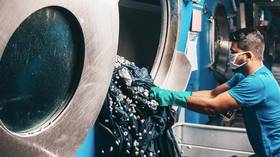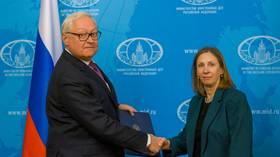Western fashion brands to compensate workers abused in African state

American clothing company PVH, the owner of Tommy Hilfiger, and Calvin Klein, British brand Barbour, and Second Clothing have agreed to pay more than $400,000 in compensation to garment workers in Mauritius after an investigation revealed alleged labor rights abuses in factories in the East African country.
Ben Skinner, the president of Transparentem, a non-profit organization based in the US, claimed on Tuesday that migrant workers had shown great courage in speaking up, and to date, only three brands had shown by their actions that they had really listened to them.
Transparentem published a report in December claiming to have discovered evidence of forced labor while investigating working conditions at five apparel manufacturing companies in the Indian Ocean island nation.
The report gathered data through interviews with 83 workers in 2022 and 2023, including migrant staff at R.E.A.L. Garments, which produces apparel for brands including PVH, Barbour, Second Clothing, Diesel, and Armani. The organization said it also found that migrant workers had paid illegal recruitment fees for their jobs and were subjected to intimidation.
“Workers told of feeling disillusionment and despair when, after paying exploitative recruitment fees they arrived in Mauritius to find that their wages were far less than their agents had told them. They described living and working conditions that no worker should endure, such as overcrowded dorms and insect infestations,” it alleges.
According to Transparentem, R.E.A.L. Garments conducted its own audit following the investigation, which reportedly revealed no evidence of workers paying recruitment fees. However, PVH, Barbour, and Second Clothing have said they will reimburse a total of $420,593 to compensate R.E.A.L. workers after carrying out an independent evaluation of factory conditions.
“R.E.A.L buyers PVH, Barbour, and Second Clothing still committed more than $420,000 for recruitment fee repayments, an important step towards giving workers the recourse they deserve. PVH committed to repaying a total of $390,456, Barbour committed to $19,523, and Second Clothing committed to $10,614,” Transparentem stated.
R.E.A.L., which has a workforce of 1,200 people, said it was taking the investigation’s findings seriously and had taken steps to improve the situation for its employees.
“We confirm that all the remediations, including repayment of local transportation fees, have been completed,” it was quoted by The Guardian as saying on Tuesday.
Mauritius is described as both a country of origin and a destination for international migration. According to Transparentem, nearly 29,000 foreign nationals, the majority of whom are from Bangladesh, were employed in Mauritius at the time of the investigation. Others are from India, China, and Madagascar, and they work primarily in the island country’s garment, construction, agriculture, and service industries, as well as food and beverage factories.
A previous report on Mauritius by the UN Committee on Economic, Social, and Cultural Rights expressed concern that migrant workers were subjected to forced labor, underpaid wages, unsafe housing, denial of benefits, deportation, and termination of contracts with pregnant employees.
Meanwhile, the Mauritian government passed the Private Recruitment Agencies Act late last year, which includes security measures for migrant workers. However, the legislation reportedly does not specify that foreign agents cannot charge fees to workers and does not include grievance mechanisms through which migrant workers can seek redress.













